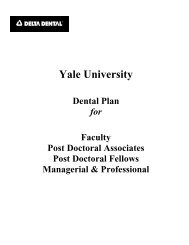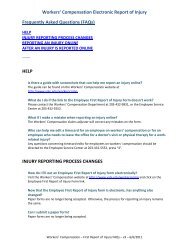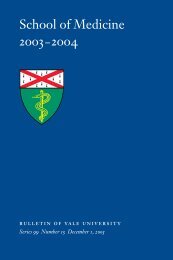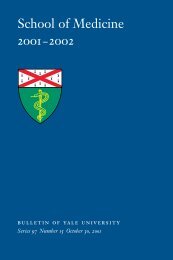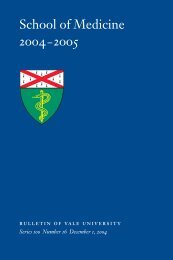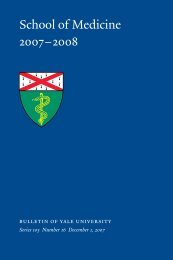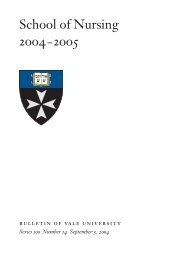bulletin 2002/nursing/pages.7 - Yale University
bulletin 2002/nursing/pages.7 - Yale University
bulletin 2002/nursing/pages.7 - Yale University
- No tags were found...
You also want an ePaper? Increase the reach of your titles
YUMPU automatically turns print PDFs into web optimized ePapers that Google loves.
Postdoctoral Training ProgramThe purpose of the postdoctoral training program is to prepare researchers whowill improve health care. Postdoctoral training builds on the predoctoral educationalexperience and prepares the investigator to conduct complex studies involving an interdisciplinaryperspective and the need for sophisticated analytic techniques. The Schoolof Nursing has two types of postdoctoral appointees: fellows, who hold individual externalfunding and are trainees, not employees; and associates, who are supported by facultyholding extramural grants and who are <strong>Yale</strong> employees. Successful candidates, in additionto meeting the application requirements, bring their own external funding orarrange a successful match with existing School of Nursing faculty and are funded by thatfaculty member’s grant. Postdoctoral appointees work with experienced facultyresearchers on ongoing studies of clinical problems, participate in interdisciplinary postdoctoraltraining programs within the <strong>University</strong>, and develop an extramural fundingproposal for post-training activities.The program is designed to provide the appointee with a framework of theoreticalknowledge necessary for a program of clinical research, the methodological skills to supportthe progression of a research career, and experience in interdisciplinary teamresearch. At the end of the training program, the appointee is able to design and conductcomplex clinical research studies, disseminate research findings to <strong>nursing</strong> and interdisciplinaryaudiences, contribute to the knowledge base for <strong>nursing</strong> practice, and preparecompetitive applications for extramural research funding.Postdoctoral appointees may take courses in the School of Nursing and in theGraduate School of Arts and Sciences, as well as in other professional schools at <strong>Yale</strong>,depending on their interests and needs. All appointees are required to participate intraining regarding the responsible conduct of research. In addition to encouraging theuse of the NIH-sponsored Web site regarding responsible conduct, the School of Nursingoffers seminars and a course, Health Care Ethics, that are available to all postdoctoralappointees. Postdoctoral appointees may take two to four courses per year. All postdoctoralappointees participate in a monthly seminar designed to enhance the postdoctoralexperience by providing opportunities for shared learning and by developing groupspecificgoals. Activities include presentations of current work, journal reviews, manuscriptreviews, mock presentations, problem solving, and role development.Selection of postdoctoral appointees is dependent upon a match with one of theSchool of Nursing’s senior researchers. Postdoctoral appointees work with a mentor whosupervises their work. Each fellow/associate develops an individualized plan of study andprogression prior to beginning the fellowship. Early in the course of the fellowship, thefellow/associate develops a plan for a pilot study which is conducted during the trainingprogram. This proposal should lead to data supporting the development of a proposal forextramural funding to be completed prior to the end of the training program.




